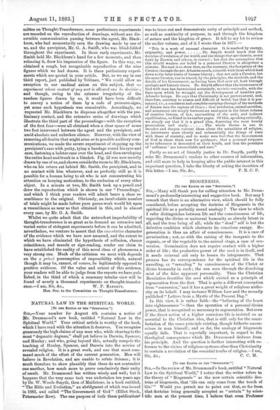BIOGENESIS.
[TO THE EDITOR OP THE "SPECTATOR.") SIR,—Many will thank you for calling attention to Mr. Drum- mond's profoundly interesting and suggestive book. But may I remark that there is an alternative view, which should be fully considered, before accepting the doctrine of Biogenesis in the spiritual life as a perfectly sound analogy P The view to whiob I refer distinguishes between life and the consciousness of life, regarding the divine or universal humanity as already latent in all, and the true being of all; while the " dead " self is but the defective condition which obstructs its conscious energy. Re- generation is thus an affair of consciousness. It is a ease of germination ; not, as with the raising of the inorganic to the organic, or of the vegetable to the animal stage, a case of con- version. Germination does not require contact with a higher order of life ; the productive power of the seed is in itself, and it needs external aid only to loosen its integuments. That process has its correspondence for the spiritual life in the unveiling, or " revealing " to consciousness of the Christ or divine humanity in each ; the sun seen through the dissolving mist of the false apparent personality. Thus the Christian Revelation fructifies the seed which existed as a principle of regeneration from the first. That is quite a different conception from " conversion," and it has a great weight of religions autho- rity on its behalf. I may instance William Law and the recently published " Letters from a Mystic of the Present Day."
In this view, it is rather faith—the "believing of the heart into righteousness "—than the operation of a personal divine power, that is recognised as necessary to regeneration. But even if the direct action of a higher conscious life is insisted on as essential to the Christian idea, that is still only for the mani- festation of the same principle existing, though hitherto uncon- scious in man himself ; and so far, the analogy of biogenesis equally fails. That is especially important, in regard to the theological consequences which Mr. Drummond deduces from his principle. And the question is further interesting with re- ference to the claims of religions systems other than Christianity to contain a revelation of the essential truths of religion.—I am,


































 Previous page
Previous page